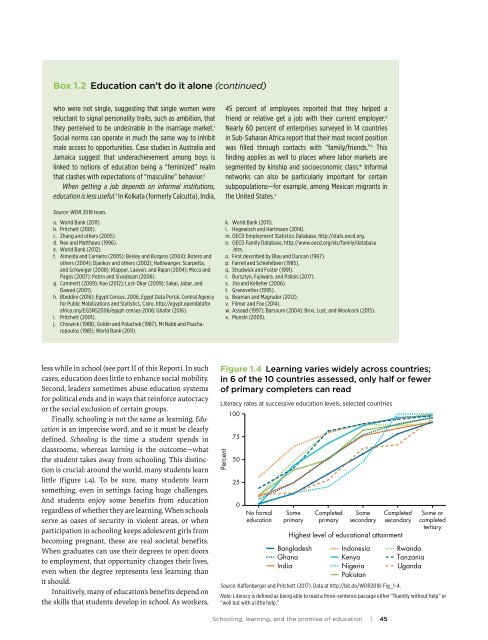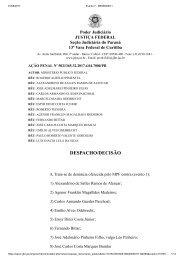Brasil só deve dominar Leitura em 260 anos, aponta estudo do Banco Mundial Relatorio Banco Mundial _Learning
Create successful ePaper yourself
Turn your PDF publications into a flip-book with our unique Google optimized e-Paper software.
Box 1.2 Education can’t <strong>do</strong> it alone (continued)<br />
who were not single, suggesting that single women were<br />
reluctant to signal personality traits, such as ambition, that<br />
they perceived to be undesirable in the marriage market. r<br />
Social norms can operate in much the same way to inhibit<br />
male access to opportunities. Case studies in Australia and<br />
Jamaica suggest that underachiev<strong>em</strong>ent among boys is<br />
linked to notions of education being a “f<strong>em</strong>inized” realm<br />
that clashes with expectations of “masculine” behavior. s<br />
When getting a job depends on informal institutions,<br />
education is less useful. t In Kolkata (formerly Calcutta), India,<br />
Source: WDR 2018 team.<br />
a. World Bank (2011).<br />
b. Pritchett (2001).<br />
c. Zhang and others (2005).<br />
d. Nee and Matthews (1996).<br />
e. World Bank (2012).<br />
f. Almeida and Carneiro (2005); Besley and Burgess (2004); Botero and<br />
others (2004); Djankov and others (2002); Haltiwanger, Scarpetta,<br />
and Schweiger (2008); Klapper, Laeven, and Rajan (2004); Micco and<br />
Pagés (2007); Petrin and Sivadasan (2006).<br />
g. Cammett (2009); Kao (2012); Lust-Okar (2009); Sakai, Jabar, and<br />
Dawod (2001).<br />
h. Bteddini (2016); Egypt Census, 2006, Egypt Data Portal, Central Agency<br />
for Public Mobilizations and Statistics, Cairo, http://egypt.opendatafor<br />
africa.org/EGSNS2006/egypt-census-2006; Ghafar (2016).<br />
i. Pritchett (2001).<br />
j. Chiswick (1988); Goldin and Polachek (1987); McNabb and Psacharopoulos<br />
(1981); World Bank (2011).<br />
45 percent of <strong>em</strong>ployees reported that they helped a<br />
friend or relative get a job with their current <strong>em</strong>ployer. u<br />
Nearly 60 percent of enterprises surveyed in 14 countries<br />
in Sub-Saharan Africa report that their most recent position<br />
was filled through contacts with “family/friends.” v This<br />
finding applies as well to places where labor markets are<br />
segmented by kinship and socioeconomic class. w Informal<br />
networks can also be particularly important for certain<br />
subpopulations—for example, among Mexican migrants in<br />
the United States. x<br />
k. World Bank (2011).<br />
l. Hegewisch and Hartmann (2014).<br />
m. OECD Employment Statistics Database, http://stats.oecd.org.<br />
n. OECD Family Database, http://www.oecd.org/els/family/database<br />
.htm.<br />
o. First described by Blau and Duncan (1967).<br />
p. Farrell and Schiefelbein (1985).<br />
q. Strudwick and Foster (1991).<br />
r. Bursztyn, Fujiwara, and Pallais (2017).<br />
s. Jha and Kelleher (2006).<br />
t. Granovetter (1995).<br />
u. Beaman and Magruder (2012).<br />
v. Filmer and Fox (2014).<br />
w. Assaad (1997); Barsoum (2004); Brixi, Lust, and Woolcock (2015).<br />
x. Munshi (2003).<br />
less while in school (see part II of this Report). In such<br />
cases, education <strong>do</strong>es little to enhance social mobility.<br />
Second, leaders sometimes abuse education syst<strong>em</strong>s<br />
for political ends and in ways that reinforce autocracy<br />
or the social exclusion of certain groups.<br />
Finally, schooling is not the same as learning. Education<br />
is an imprecise word, and so it must be clearly<br />
defined. Schooling is the time a student spends in<br />
classrooms, whereas learning is the outcome—what<br />
the student takes away from schooling. This distinction<br />
is crucial: around the world, many students learn<br />
little (figure 1.4). To be sure, many students learn<br />
something, even in settings facing huge challenges.<br />
And students enjoy some benefits from education<br />
regardless of whether they are learning. When schools<br />
serve as oases of security in violent areas, or when<br />
participation in schooling keeps a<strong>do</strong>lescent girls from<br />
becoming pregnant, these are real societal benefits.<br />
When graduates can use their degrees to open <strong>do</strong>ors<br />
to <strong>em</strong>ployment, that opportunity changes their lives,<br />
even when the degree represents less learning than<br />
it should.<br />
Intuitively, many of education’s benefits depend on<br />
the skills that students <strong>deve</strong>lop in school. As workers,<br />
Figure 1.4 <strong>Learning</strong> varies widely across countries;<br />
in 6 of the 10 countries assessed, only half or fewer<br />
of primary completers can read<br />
Literacy rates at successive education levels, selected countries<br />
100<br />
Percent<br />
75<br />
50<br />
25<br />
0<br />
No formal<br />
education<br />
Some<br />
primary<br />
Completed<br />
primary<br />
Some<br />
secondary<br />
Completed<br />
secondary<br />
Highest level of educational attainment<br />
Some or<br />
completed<br />
tertiary<br />
Bangladesh In<strong>do</strong>nesia Rwanda<br />
Ghana<br />
Kenya<br />
Tanzania<br />
India<br />
Nigeria Uganda<br />
Pakistan<br />
Source: Kaffenberger and Pritchett (2017). Data at http://bit.<strong>do</strong>/WDR2018-Fig_1-4.<br />
Note: Literacy is defined as being able to read a three-sentence passage either “fluently without help” or<br />
“well but with a little help.”<br />
Schooling, learning, and the promise of education | 45








